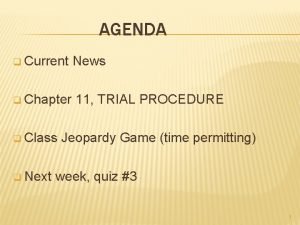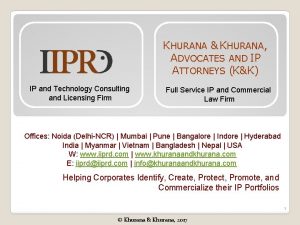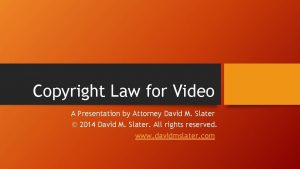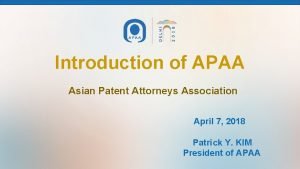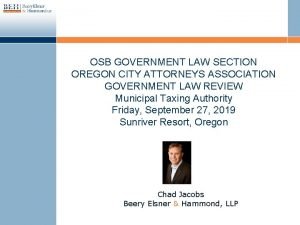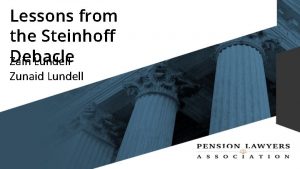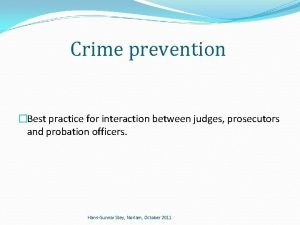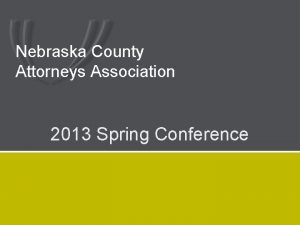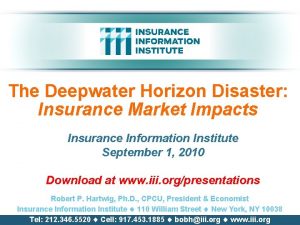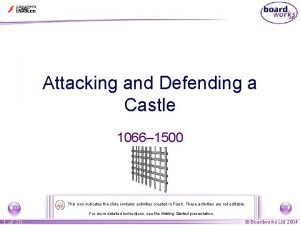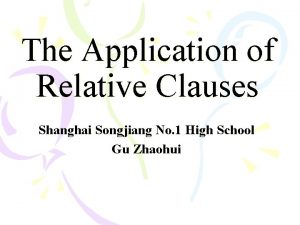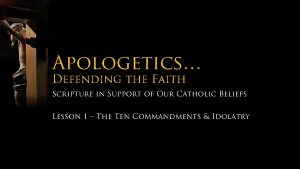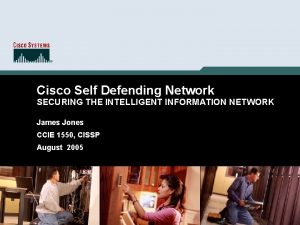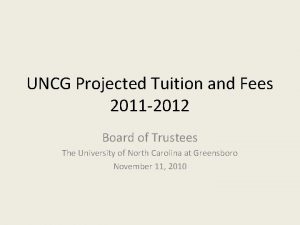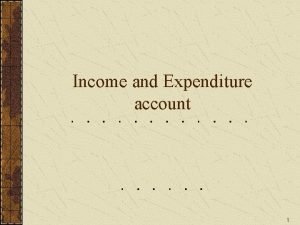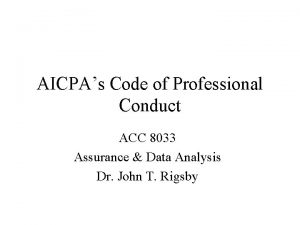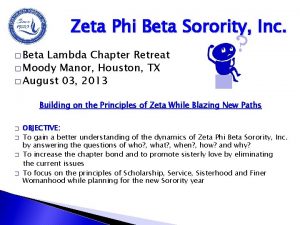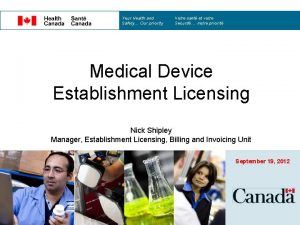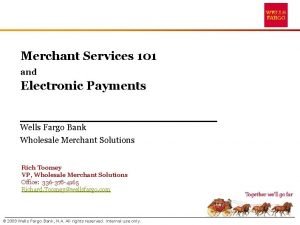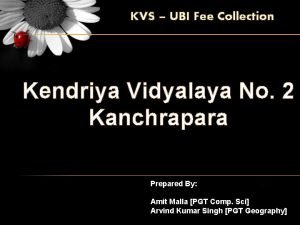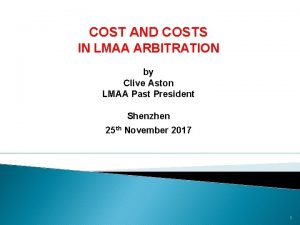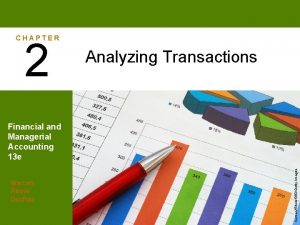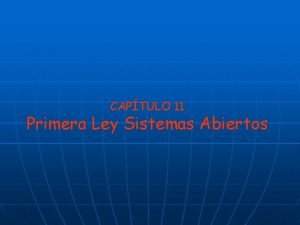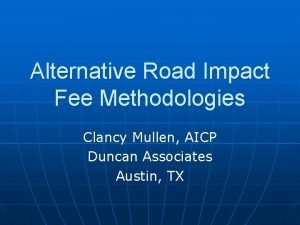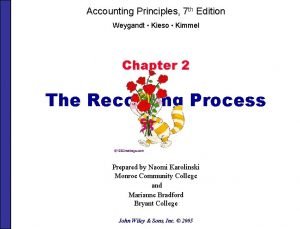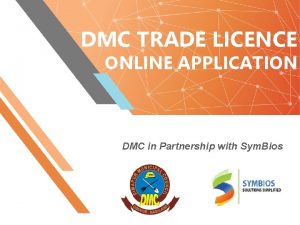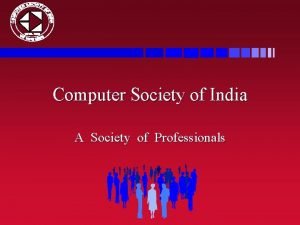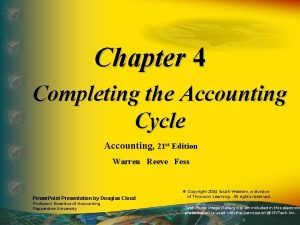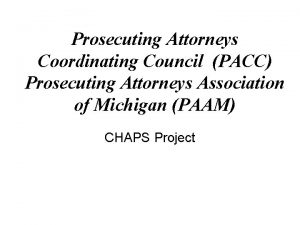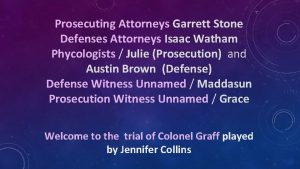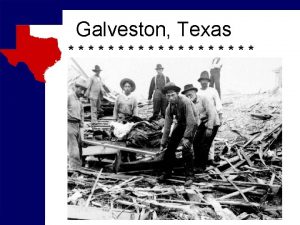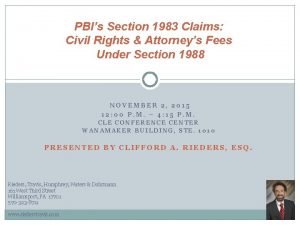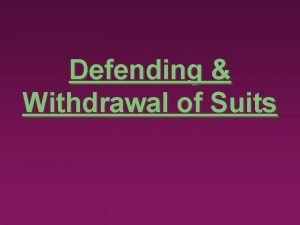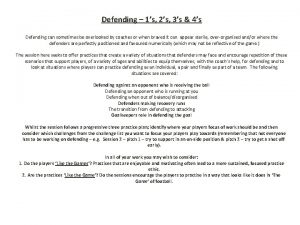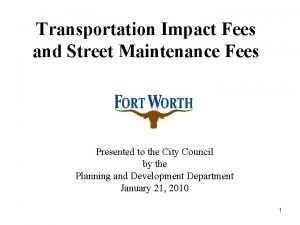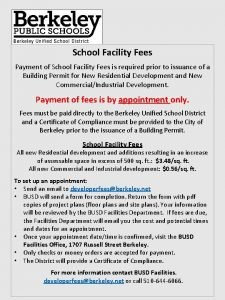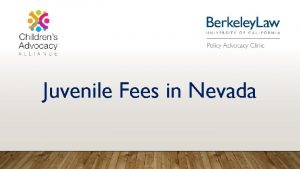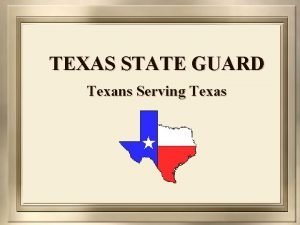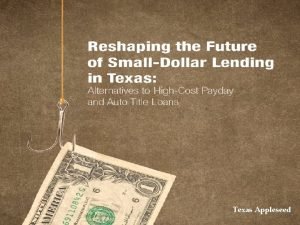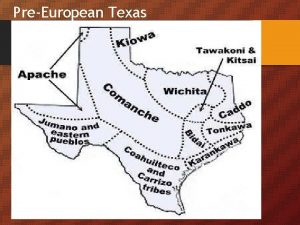Prosecuting and Defending Attorneys Fees in Texas John


















































- Slides: 50

Prosecuting and Defending Attorneys’ Fees in Texas John W. Bridger David A. Kirby May 2019 Strong Pipkin Bissell & Ledyard 4900 Woodway, Suite 1200 Houston, Texas 77056

Contractual Provisions Trump Everything • Presentment • Scope of fees • Segregation • Prevailing party

Texas Civil Practice and Remedies Code § 38. 001 A person may recover reasonable attorneys’ fees from an individual or corporation, in addition to the amount of a valid claim and costs, if the claim is for: (1) rendered services; (2) performed labor; (3) furnished material; (4) freight or express overcharges; (5) lost or damaged freight or express; (6) killed or injured stock; (7) a sworn account; or (8) an oral or written contract.

Texas Civil Practice and Remedies Code § 38. 001 A person may recover reasonable attorneys’ fees from an individual or corporation, in addition to the amount of a valid claim and costs, if the claim is for: (1) rendered services; (2) performed labor; (3) furnished material; (4) freight or express overcharges; (5) lost or damaged freight or express; (6) killed or injured stock; (7) a sworn account; or (8) an oral or written contract.

Texas Civil Practice and Remedies Code § 38. 001 A person may recover reasonable attorneys’ fees from an individual or corporation, in addition to the amount of a valid claim and costs, if the claim is for: (1) rendered services; (2) performed labor; (3) furnished material; (4) freight or express overcharges; (5) lost or damaged freight or express; (6) killed or injured stock; (7) a sworn account; or (8) an oral or written contract.


Al Hill v. Gregory Shamoun: SCOTX Reviews a $48 K an Hour Legal Fee Al Hill Jr. v. Al Hill III has spawned more than 20 tortured lawsuits involving the heirs of oilman H. L. Hunt over the past decade. Last week, the Texas Supreme Court heard arguments by Al Hill Jr. challenging a $7. 25 million fee award to Gregory Shamoun for his role in helping to resolve what’s become known as the “spider web of litigation. ”



Texas Civil Practice and Remedies Code § 38. 001 A person may recover reasonable attorneys’ fees from an individual or corporation, in addition to the amount of a valid claim and costs, if the claim is for: (1) rendered services; (2) performed labor; (3) furnished material; (4) freight or express overcharges; (5) lost or damaged freight or express; (6) killed or injured stock; (7) a sworn account; or (8) an oral or written contract.

Texas Civil Practice and Remedies Code § 38. 001 A person may recover reasonable attorneys’ fees from an individual or corporation, in addition to the amount of a valid claim and costs, if the claim is for: (1) rendered services; (2) performed labor; (3) furnished material; (4) freight or express overcharges; (5) lost or damaged freight or express; (6) killed or injured stock; (7) a sworn account; or (8) an oral or written contract.


Texas Civil Practice and Remedies Code § 38. 001 A person may recover reasonable attorneys’ fees from an individual or corporation, in addition to the amount of a valid claim and costs, if the claim is for: (1) rendered services; (2) performed labor; (3) furnished material; (4) freight or express overcharges; (5) lost or damaged freight or express; (6) killed or injured stock; (7) a sworn account; or (8) an oral or written contract.

Texas Civil Practice and Remedies Code § 38. 001 A person may recover reasonable attorneys’ fees from an individual or corporation, in addition to the amount of a valid claim and costs, if the claim is for: (1) rendered services; (2) performed labor; (3) furnished material; (4) freight or express overcharges; (5) lost or damaged freight or express; (6) killed or injured stock; (7) a sworn account; or (8) an oral or written contract.

Texas Civil Practice and Remedies Code § 38. 002 To recover attorneys’ fees under this Chapter: (1) the claimant must be represented by an attorney; (2) the claimant must present the claim to the opposing party or to a duly authorized agent of the opposing party; and (3) payment for the just amount owed must not have been tendered before the expiration of the 30 th day after the claim is presented.

Texas Civil Practice and Remedies Code § 38. 002 To recover attorneys’ fees under this Chapter: (1) the claimant must be represented by an attorney; (2) the claimant must present the claim to the opposing party or to a duly authorized agent of the opposing party; and (3) payment for the just amount owed must not have been tendered before the expiration of the 30 th day after the claim is presented.

Texas Civil Practice and Remedies Code § 38. 002 To recover attorneys’ fees under this Chapter: (1) the claimant must be represented by an attorney; (2) the claimant must present the claim to the opposing party or to a duly authorized agent of the opposing party; and (3) payment for the just amount owed must not have been tendered before the expiration of the 30 th day after the claim is presented.


Texas Civil Practice and Remedies Code § 38. 002 To recover attorneys’ fees under this Chapter: (1) the claimant must be represented by an attorney; (2) the claimant must present the claim to the opposing party or to a duly authorized agent of the opposing party; and (3) payment for the just amount owed must not have been tendered before the expiration of the 30 th day after the claim is presented.

Presentment • Claimant must plead and prove presentment • Condition precedent • Requires specific denial • No particular form of presentment required • Pleadings are not presentment • Elements of presentment: notice, amount, and time • Timing of presentment • When fees begin to accrue

Tender • Unconditional • Timing • Effect

Presentment / Excessive Demand • Debtor must plead and prove the affirmative defense • Debtor must obtain a finding of fact on excessiveness • Factors determining excessiveness • Demand exceeding award is not necessarily excessive

Presentment / Excessive Demand: Factors • The applicable insurance policy limits • The difference between the amount demanded and the amount sought at trial • The difference between the amount demanded and the amount ultimately awarded at trial • Bad faith or other unreasonable conduct by the plaintiff • Whether litigation was caused by the defendant’s failure to tender a reasonable payment • Any clear indication tender was, or would have been, refused by the plaintiff, or that negotiation would have been futile • Any dispute, at the time of the demand, as to the meaning or applicability of the policy • Any circumstance justifying the original demand at the time it was made

Prevailing Party • Ordinary meaning: receive some relief or direct benefit altering the parties’ relationship • Only one party prevails, it is not a theory by theory determination • No net recovery due to offset from counterclaim v. settlement • Amount recovered less than tendered or sought at trial does not matter, since still prevailing party • Amount at issue small enough for JP court is not a defense to fee award

Prevailing Party: Contractual Provisions • Generally, the contract controls, not statutes or case law • Prevailing party undefined: main action or main issue determinative • No relief to breaching party, unless excused • Scope of provision: broad v. narrow • Exclusive remedy and limitation of liability provisions do not preclude recovering attorneys’ fees

Prevailing Party • Attorneys’ fees typically are not damages supporting status as prevailing party • Defendant as prevailing party in contract and certain statutory • standard for prevailing defendant • Epps criteria for prevailing defendant based on non-suit without prejudice • If awarded trial fees, must be awarded appellate fees • Only successful appeal results in appellate attorneys’ fees • Appellate courts can consider record and own knowledge to assess appellate fees awards

Proof Arthur Andersen Lodestar 1. Time/labor, novelty/difficulty, and skill required 1. Nature of the work 2. Likelihood this particular employment will preclude other employment 2. Who performed the services and their rate 3. Fee customarily charged in the locality 3. Approximately when the services were performed 4. The amount involved and the results obtained 4. Number of hours worked 5. Time limitations imposed by client or circumstances 6. Nature and length of the professional relationship with client 7. Experience, reputation, and ability of the lawyer(s) 8. Contingent or fixed fee

Proof: Rohrmoos Venture • (a) applying lodestar “where it can be employed” • (b) identifying the five factor to be used “Sufficient evidence includes, at a minimum, evidence of: • (1) particular services performed • (2) who performed those services • (3) approximately when the services were performed • (4) the reasonable amount of time required to perform the services • (5) the reasonable hourly rate for each person performing such services”

Proof: Rohrmoos Venture • (c) limiting Garcia and Kinsel, both of which found minimal evidence supported an attorneys’ fees award, to their facts and to no evidence challenge • (d) rejecting the minimalistic approach permitted by cases such as Jeff Kaiser PC • (e) requiring what federal courts refer to as “good billing judgment” to eliminate hours that are: • excessive • redundant • duplicative • inadequately documented • otherwise unnecessary

Proof: Rohrmoos Venture • (f) finding lodestar driven fees to be presumptively (or, later, strongly presumptively) reasonable • (g) once lodestar is proven, shifting burden of proof to the fee opponent to reduce the fee below lodestar

Proof: Rohrmoos Venture • (h) recognizing courts can still enhance fees up or down, but not based on Arthur Andersen “considerations” subsumed in the base lodestar calculation • the time and labor required • the novelty and difficulty of the questions involved • the skill required to perform the legal service properly • the fee customarily charged in the locality for similar legal services • the amount involved • the experience, reputation, and ability of the lawyer or lawyers performing the services • whether the fee is fixed or contingent on results obtained • the uncertainty of collection before the legal services have been rendered • results obtained

Proof: Rohrmoos Venture • (i) introducing contemporaneous billing records is strongly encouraged, but not mandated • (j) rejecting broad descriptions of categories of work as insufficient without more • reviewed millions of pages of documents • attended 40 plus depositions • filed five motions to compel • responded to extensive motion for summary judgment

Proof: Rohrmoos Venture • This decision now begs several questions for further development • (1) under what circumstances can lodestar not be employed • (2) other than contemporaneous billing records, what, if any, other documents or testimony will suffice and under what circumstances will these other forms of proof suffice • prior cases having allowed spreadsheets summaries (likely no longer sufficient) • fee reconstruction • forensic review of the file • (3) with this new, bright line standard, will courts now be more willing to render for insufficient proof, instead of the near universal remand to resolve almost all attorneys’ fees deficiencies

Proof • Reasonable hourly rate • Contingency fees not necessarily precluded as unreasonable • proving a contingency fee • jury getting close to lodestar • if damages reduced, offer remittur • Fees not paid, in whole or in part, or paid by third party still recoverable • discounted rates

Proof: Contemporaneous Billing Records • Strongly recommended, not mandatory • Clerical task time prohibited • Must allocate specific time to specific tasks • block billing not prohibited • Redacting • Reconstruction • Editing

Proof: Objections to Attorneys’ Fees • Be specific, documented, and proven by example • Vagueness, redaction, block billing, should be tied to precluding crossexamination on a substantive ground • Consider satisfying defendant’s arguably valid objections




Segregating Fees • Historical Sterling exception for intertwined facts • Chapa modifies Sterling, mandating task by task segregation

Segregating Fees • Segregating for counterclaims, cross-claims, and affirmative defenses • Segregating by defendant • Contractual provisions impacting segregation • Segregating by estimating a percentage attributable to unrecoverable claims • Appellate fees should be segregated • Unsegregated fees result in remand, not rendition

Segregating Fees: Practice Points • Entry-by-entry segregation • Hard line approach to segregation • Discounted fees • paragraphs in petition • Estimate only if you have to • pages in depositions • Also keep track of your unrecoverable time • interrogatory by interrogatory • Appellate fees • Start putting together objectionable • Offer to remit time entries early • Seek new trial • Consider NOT pleading the unrecoverable action

Uncontroverted, Non-Conclusory Fees • Uncontroverted fees should be awarded as a matter of law • Even minimal testimony may suffice and avoid exclusion as conclusory • Opposing party’s objections and motion to strike inadequate to controvert if not sustained or granted

Controverted Fees • Controverting testimony requires an expert • Controverting testimony cannot be general or conclusory • Controverted attorneys’ fees upheld if in range of evidence • Cross-examination may constitute sufficient controversion • trial fees • appellate fees require separate cross-examination

Other Proof Considerations • Recovering for preparing fee application or affidavit • Supplementing fee application or affidavit • Default judgment attorneys’ fees award requires proper proof as are unliquidated damages • Appellate fees: detailed analysis should be provided or required • Possible objections to attorneys’ fee evidence • Motions for summary judgment v. motions to award attorneys’ fees

List of Possible Objections to Attorneys’ Fees Evidence (Pages 100 -102)

Miscellaneous • No pre-judgment interest on fees, unless fees have already been paid • No bonding on appeal for attorneys’ fees • Dangers of severing attorneys’ fees from the underlying action authorizing them • One satisfaction rule: fraud, punitive damages, and attorneys’ fees • Post-judgment interest on conditional appellate fees begins to accrue on date of appellate decision made final

Miscellaneous • Defendant’s rights to attorneys’ fees survives plaintiff’s non-suit • Award of appellate attorneys’ fees must be conditioned on success at the appellate level • Where damages reduced on appeal should remand for reconsideration of attorneys’ fees • You prevail, but deem your attorneys’ fees award to be inadequate (or none are awarded at all), you must file your own notice of appeal per TRAP 25. 1(c) • Attorneys’ fees awards are not subsumed in appellate issue attacking grounds for awarding them

Miscellaneous: Discovery Issues • Disclosure: attorneys’ fees not economic damages requiring disclosure under Rule 194(d) • Late production/disclosure does not necessarily result in exclusion of attorneys’ fees proof and witness • Usually cannot get opposing parties’ billing records in discovery • Disclosure: minimal designation is sufficient under Rule 194. 2(f)(3)

A Few Thoughts on Strategy • Forum • Judge v. jury • Retained expert v. trial counsel • Discovery • Affidavit v. live testimony (or both) • What to ask for
 O.j. simpson prosecuting attorneys
O.j. simpson prosecuting attorneys Khurana & khurana advocates and ip attorneys (delhi branch)
Khurana & khurana advocates and ip attorneys (delhi branch) Khurana & khurana advocates and ip attorneys
Khurana & khurana advocates and ip attorneys Berne convention
Berne convention Asian patent attorneys association
Asian patent attorneys association Oregon city attorneys association
Oregon city attorneys association Zain lundell
Zain lundell Norlam attorneys
Norlam attorneys Nebraska county attorneys association
Nebraska county attorneys association Brownsville lhwca lawyers
Brownsville lhwca lawyers Attacking and defending a castle
Attacking and defending a castle Why is it important to defend your faith
Why is it important to defend your faith Defending and non defining relative clauses
Defending and non defining relative clauses Was magellan worth defending?
Was magellan worth defending? What is maycomb’s usual disease
What is maycomb’s usual disease Self-defending infrastructure
Self-defending infrastructure Defending the faith verses
Defending the faith verses Covetous antisocial
Covetous antisocial Defending sola scriptura
Defending sola scriptura Cisco self defending network
Cisco self defending network Portland state university undergraduate tuition and fees
Portland state university undergraduate tuition and fees Uncg tuition cost
Uncg tuition cost Life membership fees in income and expenditure account
Life membership fees in income and expenditure account What is immediate family considered
What is immediate family considered Cushing and dolan fees
Cushing and dolan fees Cushing dolan
Cushing dolan Zeta phi beta kitty meaning
Zeta phi beta kitty meaning Mdel fees
Mdel fees Meed wced
Meed wced Uwaterloo fees arranged deadline
Uwaterloo fees arranged deadline Vinod sampat
Vinod sampat Wells fargo payment gateway
Wells fargo payment gateway Ubifee
Ubifee Ib mission statement
Ib mission statement Fidelity fiduciary services
Fidelity fiduciary services Motse maria high school
Motse maria high school Lmaa fees
Lmaa fees Horizontal analysis example
Horizontal analysis example Primera ley para sistemas abiertos
Primera ley para sistemas abiertos Achd impact fees
Achd impact fees Fees earned journal entry
Fees earned journal entry Uenr today
Uenr today Isi japanese language school
Isi japanese language school Dumas lions club
Dumas lions club Mount litera zee school nagpur besa
Mount litera zee school nagpur besa Leading university tuition fees
Leading university tuition fees Dmc trade
Dmc trade Swapd fees calculator
Swapd fees calculator Computer society of india logo
Computer society of india logo Fees earned debit or credit
Fees earned debit or credit Fees earned debit or credit
Fees earned debit or credit
